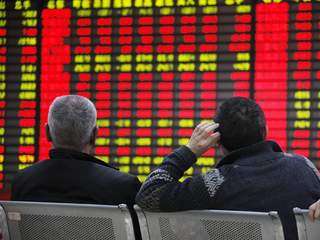 Asian Stocks to U.S. Futures Tumble as Shutdown Looms; Oil Drops
Asian Stocks to U.S. Futures Tumble as Shutdown Looms; Oil Drops
Sept. 30 (Bloomberg) — Asian stocks fell, paring the biggest monthly jump in the regional benchmark gauge since January 2012, and U.S. equity-index futures declined before a potential U.S. government shutdown. The Japanese yen and Treasuries rose as emerging market currencies weakened.
The MSCI Asia Pacific Index lost 1.1 percent by 11:38 a.m. in Singapore, trimming September’s advance to 7 percent. Standard & Poor’s 500 Index futures sank 0.6 percent. Treasuries and Australian bonds climbed. The dollar declined 0.4 percent versus the yen, while strengthening against currencies from Malaysia to Indonesia. West Texas Intermediate oil fell 1.3 percent, heading for an almost three-month low.
Congress has just one day to end a stalemate that raises the risk of the first government shutdown in 17 years and threatens talks to increase the debt limit. Italy’s government is on the verge of collapse after allies of former leader Silvio Berlusconi said they’d quit the cabinet. China’s manufacturing rose less than economists estimated in September.
“There’s been more posturing over the weekend from all sides and to the extent this is a work in progress it’s putting pressure on the market,” Walter “Bucky” Hellwig, who helps manage $17 billion of assets at BB&T Wealth Management in Birmingham, Alabama, said by phone. “This process is messy. It may be coloring expectations for when they do address the debt ceiling in the next few weeks.”
Debt Ceiling
Nine of the 10 groups on the Asian equity gauge fell. Japan’s Topix Index tumbled 1.3 percent, trimming its first monthly advance since April to 8.7 percent. The Kospi Index in Seoul fell 0.4 percent and Australia’s S&P/ASX 200 Index halted a three-day gain, sliding 1.2 percent from a more than five-year high. The Hang Seng China Enterprises Index in Hong Kong lost 1.3 percent.
The House of Representatives voted 231-192 yesterday to stop many of the Affordable Care Act’s central provisions for one year, tying it to an extension of U.S. government funding through Dec. 15. Should the Senate reject the bill today the government could be shut down from tomorrow. Even if the budget fight is resolved, lawmakers would immediately move to the next fiscal dispute over raising the $16.7 trillion debt ceiling.
“While a shutdown itself would not be very impactful in the short term, the lack of cooperation across the aisle doesn’t make me feel confident that a resolution on the debt ceiling will be reached in time,” Paul Zemsky, New York-based head of asset allocation at ING Investment Management LLC, which oversees $180 billion, said by e-mail. “That would be much more disruptive to the economy and the markets.”
Ringgit, Aussie
Failure to approve funding to keep the government open and to raise the debt ceiling would have a destabilizing effect on the economy, President Barack Obama said in a televised statement Sept. 27. Closing the government would cut fourth- quarter economic growth by as much as 1.4 percentage points depending on its length, according to economists from Moody’s Analytics Inc. to Economic Outlook Group LLC.
The ringgit depreciated 0.5 percent per dollar, set for the weakest close since Sept. 13, while the Indonesian rupiah dropped 1.1 percent. Australia’s currency, known as the Aussie, slipped a fifth day, losing 0.1 percent, set for a 4.6 percent advance in September, the first monthly gain since March.
The yen climbed against all 16 major peers and touched a one-month high of 97.53 per dollar today. The currency reached a three-week high per the euro as demand for safety increased after Italy’s leaders stopped short yesterday of dissolving Prime Minister Enrico Letta’s five-month old administration.
Berlusconi said he will push for snap elections, while Letta has said he plans a confidence vote in parliament Oct. 2 to seek a new majority.
Chinese Manufacturing
HSBC Holdings Plc and Markit Economics said today that their manufacturing purchasing managers’ index for China delivered a reading of 50.2 for September, falling short of an estimate of 51.2 in Bloomberg survey. Fifty is the threshold between contraction and expansion. A report in Japan showed industrial production unexpectedly fell 0.2 percent in August from a year ago, after rising 1.8 percent in July. Analysts surveyed by Bloomberg called for a 0.5 percent gain.
Ten-year Treasury yields fell three basis points to 2.59 percent today, after slipping 11 basis points in the five days ended Sept. 27. Australian government bonds due in a decade yielded 3.80 percent, down seven basis points, or 0.07 percentage point, in a second day of declines.
WTI crude oil slid to $101.55 a barrel, headed for the lowest close since July 3. Brent futures lost 0.8 percent to $107.75 a barrel, while contracts on gasoline slipped 0.8 percent. Gold rose 0.3 percent, paring its monthly loss to 3.8 percent. Copper for three-month delivery on the London Metal Exchange fell 0.4 percent, while aluminum lost 0.5 percent.










Add comment